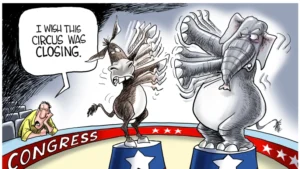 Monday, September 3, 2012
Monday, September 3, 2012
It’s Labor Day, the unofficial start of the campaign. It’s a date that assumes voters are less interested in the election than the media and the candidates who are running, and will zone out if you campaign full-bore for more than two months. Many people, poll results notwithstanding, including both the undecided and people leaning to one candidate or the other, won’t finalize their decisions until Election Day. This is a good thing for challengers who don’t want voters making up their minds too soon.
You’re running against a long-term, very well funded incumbent Congressman, with barely enough money in the bank to meet your campaign’s nut between now and November 6. For months, you’ve been telling yourself that the campaign won’t get started in earnest until after the conventions – which is exactly what the incumbents would like you to believe.
Waiting until the last minute is fine if you’re flush with cash and ahead in the polls. But you? You should have been campaigning your ass off for months, using every honest trick in the books to develop name recognition and keep undecided voters and soft-supporters of the incumbent in play. Ironically, the initiatives you should have taken, but didn’t think you could afford, would have helped you raise the money you needed to pay for them, but you didn’t know that.
Now what? With just over 60 days to go, and nowhere near enough money to blunt the impact of the incumbent’s media blitz that’s coming, what are you going to do? So far so good, you’ve come to the Next Contestant for advice. And that advice is, “Go bold.” The time for standing on corners waving signs and dropping in on the neighborhood book club is over. You’ve got just two months to make two or three big points. Use the time wisely, or start writing your concession speech.
1. Polling. If you haven’t already, conduct your own, professionally designed and conducted poll, as soon as possible, to find out how far behind you are, and where you need to concentrate your campaigning. If, miracle of miracles, the race is close, within let’s say five points, take your numbers to your party and ask for money.
Polls are expensive. Running one in your Congressional District, for example, where a sample size of 600 may be sufficient, might cost you $15,000 ($25/respondent) – and take two weeks to complete. It’s expensive, but you’re not a serious Congressional candidate if you don’t have at least one done. Thinking of waiting for someone else to do it for you? Like the incumbent who can afford it? Maybe the local big city paper or one of the network stations? The incumbent isn’t likely to share his findings, particularly if they help you raise money and focus your campaign, and the media, in polls they sometimes run, may not ask the specific questions you need to answer. Their job is “breaking news.” Yours is getting elected.
2. Campaign financing. Use the fact that the incumbent is so much better funded against him (or her). Check the Federal Elections Commission reports on-line. Chances are you’ll find that the incumbent has taken big money from Political Action Committees, other than the incumbent’s party. So what? Those committees are buying access to the incumbent that ordinary voters can’t afford and won’t get. Use the free media to publicize those PAC contributions. Your goal is to portray the incumbent as the candidate of special interests, and you as the people’s candidate. Tell the voters, every chance you get, that their special interests are the only ones you represent.
If you’ve taken contributions from special interest PACs, return them. Hold a high profile press conference, announce that you are returning the money and tell the voters why. Dare the incumbent to do the same. Ask voters to contribute to your campaign to help level the playing field – and watch what happens. You’ve made a bold and grand gesture. Tell the voters that it’s their turn to step-up and take back their government.
3. Legislative history. Check various on-line sources for information about the bills the incumbent introduced, sponsored and for which he or she voted. For the most part, you’ll find that he did next to nothing other than rubber stamp this party’s line. If he’s a Democrat, that means he voted for economic recovery programs costing many billions of dollars that have failed to accomplish their objective. Once again, use the free media to label the incumbent a do-nothing, rubber stamp we’ve been paying $174,000 a year.
Insist that the voters hold the incumbent responsible for the ineffectiveness of government while he has been in office, and volunteer that you intend to be held to the same standard. Tell them that you’ll justify their continuing support by virtue of what you do for your District and for our country, not by spending your time suggesting low priority, often trivial legislation and raising money from special interests. Demand that the incumbent tell the people of your District precisely what he’s done to warrant re-election. Call him out, and when he has no good answer for that most basic of all election questions, tell them what you’re going to do for them, for their families and for the businesses where they work and that they own.
What? You don’t feel comfortable going after the incumbent? Well, grow up. The incumbent isn’t going to talk about the poor job he’s been doing at the public’s expense. The incumbent isn’t going to volunteer how little he understands about the economy and other major issues of our time. If you don’t make his shortcomings clear to the voters of your District, who will? No one, and he wins by default. Your comments and ads, if you can afford them, don’t have to be loud, obnoxious or misleading. In any case, the one thing you can’t afford to be is timid. Just tell the truth about the incumbent in a clear, professional voice that voters will respect.
4. Fiscal irresponsibility. Same approach, but this time hold the incumbent responsible for the reckless manner in which our government has incurred additional trillions of dollars of debt – and for the fact that we haven’t even had a federal budget for the past three years, let alone a balanced one.
Okay, you’re spending every chance you get – making speeches, calling talk radio shows, writing op/ed pieces, holding press conferences, everything you can to get free exposure – labeling the incumbent a do-noting, fiscally irresponsible candidate of special interests who hasn’t a clue how to help our economy recover. Now it’s time to focus on jobs, jobs and more jobs.
5. Jobs. Find out who is unemployed in your Congressional District. Not their names per se, but how many people are unemployed and where. Get some advice if you need it, and devise a short list of specific programs that will help them, and the local businesses where they used to shop. Don’t talk in terms of generalities, about programs and projects that will take months, maybe years to accomplish with uncertain results. That’s what incumbents do. Talk about affordable programs that will have the most significant, IMMEDIATE impact on unemployment and voter family income. Talk about these programs every chance you get. Give the voters hope, but not by misleading or leading them on. Give them good reason to believe in you.
6. Focus. This may be the hardest part. You need to focus your campaigning on those parts of your District where there are undecided voters and soft incumbent supporters who can be convinced to change their minds. Find these people, and put everything you’ve got in front of them. There’s a school of thought that says you’ve got to energize your base – and that’s a good thing if you have time and enough money, but you don’t. You’re going to have to let your base take care of itself, and risk everything focusing on voters who haven’t yet, but may still decide in your favor.
“Oh, yeah? That’s easy for you to say. You’re not running for office!” Hmm. True, but then I dare you to comment back, anonymously if you like, a rough outline of your current campaign plan for beating your long-term, well-funded incumbent in just 60 days. My guess is, you don’t have a plan that has a chance of winning. …There. I said it. Incumbents, even the do-nothing kind that are most of them in Washington, are really hard to beat. You don’t want to write me back? Fine. Sit down and write an annotated list of affordable things you’re going to do to beat the incumbent. And then read that list out loud and tell yourself, honestly, if you’re convinced.
-Next Contestant

